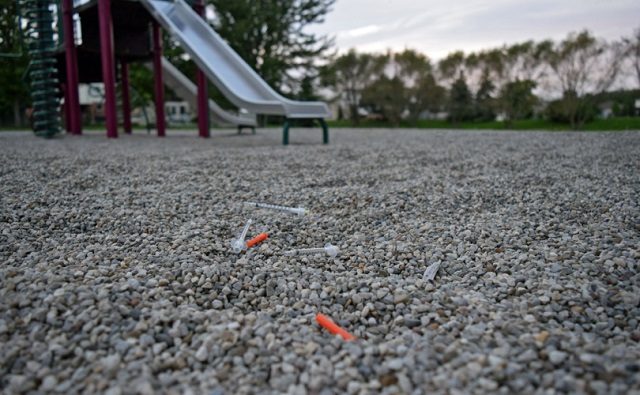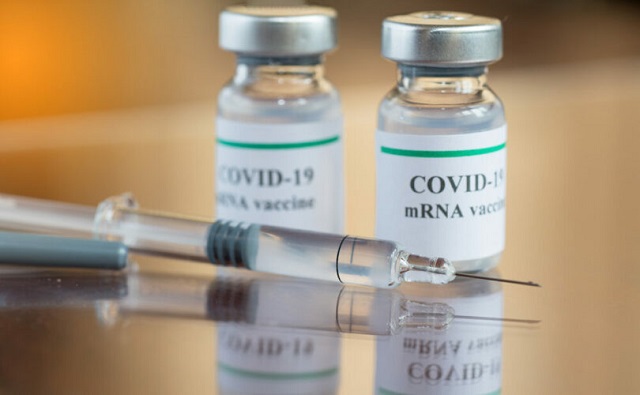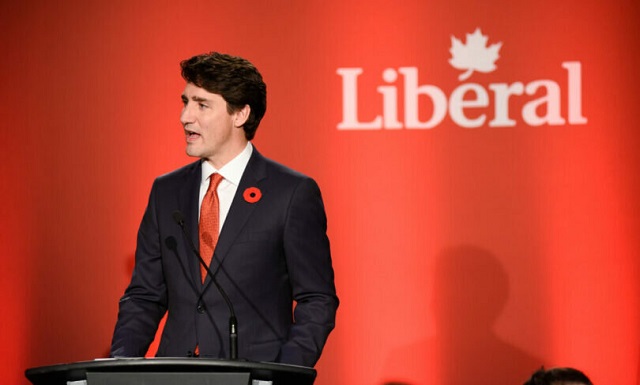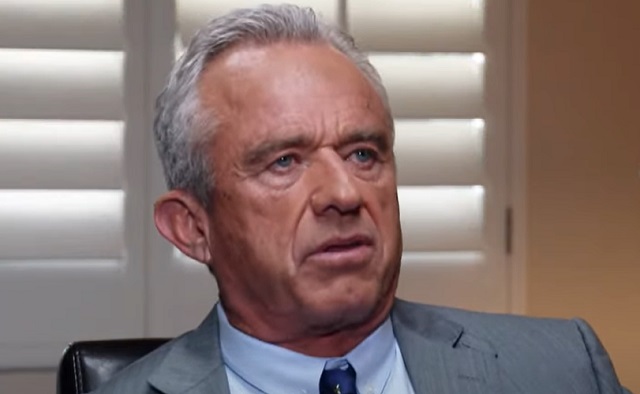Addictions
British Columbia Supreme Court rules province’s constitution protects hard drug use on playgrounds

From LifeSiteNews
Hinkson even admitted that playgrounds would be exposed to having bio-hazardous drug paraphernalia but claimed that these issues take a back seat to the province’s drug overdose problems.
In light of the federal government relaxed stance on hard drug use in British Columbia, the province’s Supreme Court ruled that preventing drug users from going near playgrounds would violate their constitutional right and cause “irreparable harm.”
The NDP provincial government was considering amendments to a federal government hard drug use allowance pilot that allowed hard drugs to be consumed in small quantities by banning hard drug use near areas where kids gather, such as playgrounds.
NDP British Columbia Premier David Eby had said of his government’s amendment in May 2023 that “nobody wants this activity affecting our kids, and we will do something.”
Many municipalities had complained that parks and playgrounds should be off-limits to drug users and stay protected, per the Controlled Drugs and Substances Act.
The government’s amendment was encoded after a bill was passed last November that directed police to ensure illegal drugs in playgrounds were not allowed, and those doing so should be told to leave or face arrest if they did not comply.
The province’s playground amendment was put in place on September 18, 2023, which in effect barred hard drug use near playgrounds. It should be noted that the original decriminalization law included an exception banning drug use near “childcare facility premises.”
However, the province’s Supreme Court responded with an injunction that struck down this amendment in December 2023. The court’s injunction to the province’s law, which banned hard drug use near playgrounds, ruled that this amendment was a violation of the Charter of Rights and Freedoms.
According to provincial Supreme Court Chief Justice Christopher Hinkson, banning hard drug use in areas where kids congregate would cause “harm” to drug users.
Hinkson even admitted that playgrounds would be exposed to having bio-hazardous drug paraphernalia but claimed that these issues take a back seat to the province’s drug overdose problems.
“I … accept that the attendant public safety risks are particularly concerning given that many of the restricted areas and places in the Act are frequented by seniors, people with disabilities, and families with young children,” Hinkson wrote in his ruling.
Ruling ‘outrageous,’ says Conservative MP
Conservative MP Kerry-Lynne Findlay for South Surrey-White Rock, British Columbia, blasted the court’s ruling.
“Crime, chaos, drugs and disorder. An outrageous decision by the BC Supreme Court that only advances Trudeau’s radical agenda and puts our children at risk,” Findlay posted December 30 on X (formerly Twitter).
“Instead of normalizing open drug use, Conservatives will bring home safe communities & ensure our loved ones suffering from addiction are treated with compassion and on a path to recovery.”
The court injunction stemmed from the Harm Reduction Nurses Association arguing in court that restricting hard drug use near playgrounds would result in “lone drug use” that would lead to more overdoses.
“It is apparent that public consumption and consuming drugs in the company of others is oftentimes the safest, healthiest, and/or only available option for an individual,” Hinkson ruled.
Provincial government lawyers argued in court that the Harm Reduction Nurses Association was trying to use “anecdotal evidence, unsubstantiated conclusory statements” by claiming its amendment would cause harm.
Hinkson disagreed. “Given the evidence before me, I find that there is a high degree of probability that at least some of the harm set out by the plaintiff will in fact occur,” he said.
He also said the provincial amendment would violate one’s “right to life, liberty and security of the person” guaranteed by section 7 of the Charter of Rights and Freedoms.
“I am satisfied that the suspension of the Act … can be properly characterized as a substantial public benefit,” he ruled.
His injunction will stay in place until March 31, 2024.
Deaths from drug overdoses in Canada have gone through the roof, notably after the Trudeau government relaxed the nation’s hard drug rules in British Columbia on a trial basis.
Trudeau’s federal policy put in place in May 2022 in effect decriminalized hard drugs, including heroin, cocaine, fentanyl, meth and MDMA on a trial-run basis in British Columbia. While the policy was approved in 2022, it did not come into effect until February 2023.
Under the policy, the federal government began allowing people within the province to possess up to 2.5 grams of hard drugs without criminal penalty, but selling drugs remained a crime.
The policy has been widely criticized, especially after it was found that the province broke three different drug-related overdose records in the first month the new law was in effect.
Despite the policy, deaths from drug overdoses in Canada continue to skyrocket. The most recent statistics from 2021 show that they went up 33%.
Addictions
Why can’t we just say no?

From the Frontier Centre for Public Policy
Drug use and violence have become common place in hospitals. Drug-addicted patients openly smoke meth and fentanyl, and inject heroin. Dealers traffic illicit drugs. Nurses are harassed, forced to work amidst the toxic fumes from drugs and can’t confiscate weapons. In short, according to one nurse, “We’ve absolutely lost control.”
“Defining deviancy down” is a cultural philosophy that emerged in the United States during the 1990s.
It refers to society’s tendency to adjust its standards of deviancy “down,” so that behaviours which were once unacceptable become acceptable. Over time, this newly- acceptable behaviour can even become society’s norm.
Of course, the converse must also be true — society looks down on those who label social behaviours “wrong,” deeming them moralistic, judgemental or simply out of touch with the realities of modern life.
Thirty years later, this philosophy is entrenched in British Columbia politics and policies. The province has become a society that cannot say “no” to harmful or wrong behaviours related to drug use. It doesn’t matter if you view drug use as a medical issue, a law-and-order issue, or both – we have lost the ability to simply say “no” to harmful or wrong behaviour.
That much has become abundantly clear over the past two weeks as evidence mounts that BC’s experiment with decriminalization and safe supply of hard drugs is only making things worse.
A recently-leaked memo from BC’s Northern Health Authority shows the deleterious impact these measures have had on BC’s hospitals.
The memo instructs staff at the region’s hospitals to tolerate and not intervene with illegal drug use by patients. Apparently, staff should not be taking away any drugs or personal items like a knife or other weapons under four inches long. Staff cannot restrict visitors even if they are openly bringing illicit drugs into the hospital and conducting their drug transactions in the hallways.
The public was quite rightly outraged at the news and BC’s Health Minister Adrian Dix quickly attempted to contain the mess by saying that the memo was outdated and poorly worded.
But his facile excuses were quickly exposed by publication of the very clearly worded memo and by nurses from across the province who came forward to tell their stories of what is really happening in our hospitals.
The President of the BC Nurses Union, Adriane Gear, said the issue was “widespread” and “of significant magnitude.” She commented that the problems in hospitals spiked once the province decriminalized drugs. In a telling quote, she said, “Before there would be behaviours that just wouldn’t be tolerated, whereas now, because of decriminalization, it is being tolerated.”
Other nurses said the problem wasn’t limited to the Northern Health Authority. They came forward (both anonymously and openly) to say that drug use and violence have become common place in hospitals. Drug-addicted patients openly smoke meth and fentanyl, and inject heroin. Dealers traffic illicit drugs. Nurses are harassed, forced to work amidst the toxic fumes from drugs and can’t confiscate weapons. In short, according to one nurse, “We’ve absolutely lost control.”
People think that drug policies have no impact on those outside of drug circles – but what about those who have to share a room with a drug-smoking patient?
No wonder healthcare workers are demoralized and leaving in droves. Maybe it isn’t just related to the chaos of Covid.
The shibboleth of decriminalization faced further damage when Fiona Wilson, the deputy chief of Vancouver’s Police Department, testified before a federal Parliamentary committee to say that the policy has been a failure. There have been more negative impacts than positive, and no decreases in overdose deaths or the overdose rate. (If such data emerged from any other healthcare experiment, it would immediately be shut down).
Wison also confirmed that safe supply drugs are being re-directed to illegal markets and now account for 50% of safe supply drugs that are seized. Her words echoed those of BC’s nurses when she told the committee that the police, “have absolutely no authority to address the problem of drug use.”
Once Premier David Eby and Health Minister Adrian Dix stopped denying that drug use was occurring in hospitals, they continued their laissez-faire approach to illegal drugs with a plan to create “safe consumption sites” at hospitals. When that lacked public appeal, Mr. Dix said the province would establish a task force to study the issue.
What exactly needs to be studied?
The NDP government appears to be uninformed, at best, and dishonest, at worst. It has backed itself into a corner and is now taking frantic and even ludicrous steps to legitimize its experimental policy of decriminalization. The realities that show it is not working and is creating harm towards others and toward institutions that should be a haven for healing.
How quickly we have become a society that lacks the moral will – and the moral credibility – to just to say “no.”
Susan Martinuk is a Senior Fellow with the Frontier Centre for Public Policy and author of Patients at Risk: Exposing Canada’s Health-care Crisis.
Addictions
British Columbia should allow addicts to possess even more drugs, federal report suggests

From LifeSiteNews
Despite the drug crisis only getting worse in British Columbia after decriminalization, a federal report by the Canadian Institutes of Health Research advocates for further relaxing its policy so addicts can possess even more drugs.
Despite the drug crisis only worsening since decriminalization, federal researchers are now advocating for British Columbia to allow the possession of even larger quantities of cocaine, claiming that current possession limits don’t allow addicts to buy enough.
According to a federal report published April 23 by Blacklock’s Reporter, the current decriminalization program in British Columbia approved by Prime Minister Justin Trudeau’s government has set cocaine possession limits “too low.”
“People who use drugs are less concerned about being arrested and feel more comfortable carrying substances they need,” said the report by the Canadian Institutes of Health Research. “The threshold of 2.5 grams is too low and is unreflective of users’ substance use and purchasing patterns.”
Under the policy, which launched in early 2023, the federal government began allowing people within the province to possess up to 2.5 grams of hard drugs – including cocaine, opioids, ecstasy and methamphetamine – without criminal penalty, but selling drugs remained a crime.
The policy has been widely criticized, especially after it was found that the province broke three different drug-related overdose records in the first month the new law was in effect.
However, now researchers are claiming that the new policy is insufficient for drug users.
“People who use drugs indicated the 2.5 gram threshold is too low and unreflective of their substance use patterns,” the report stated. “Although some people indicated the policy wouldn’t impact their purchasing patterns because they are unable to purchase large amounts at a time, others suggested it may force them to seek out substances more frequently which could increase their risk of harms.”
“Buying in bulk may be more economical particularly for people who use drugs,” it continued, adding that it was “common practice to purchase in bulk and split or share among peers.”
The recommendation comes as deaths from drug overdoses in Canada have gone through the roof in recent years, particularly in British Columbia.
The effects of decriminalizing hard drugs in various parts of Canada has been exposed in Aaron Gunn’s recent documentary, Canada is Dying, and in U.K. Telegraph journalist Steven Edginton’s mini-documentary, Canada’s Woke Nightmare: A Warning to the West.
Gunn says he documents the “general societal chaos and explosion of drug use in every major Canadian city.”
“Overdose deaths are up 1,000 percent in the last 10 years,” he said in his film, adding that “[e]very day in Vancouver four people are randomly attacked.”
Similarly, even Liberals have begun to condemn Trudeau’s “safe supply” program, linking them to “chaos” in cities.
“Safe supply“ is the term used to refer to government-prescribed drugs that are given to addicts under the assumption that a more controlled batch of narcotics reduces the risk of overdose – critics of the policy argue that giving addicts drugs only enables their behavior, puts the public at risk, disincentivizes recovery from addiction and has not reduced, and sometimes even increased, overdose deaths where implemented.
Last week, Liberal MP Dr. Marcus Powlowski revealed that violence from drug users has become a problem in Ottawa, especially in areas near so-called “safe supply” drug sites which operate within blocks of Parliament Hill.
“A few months ago I was downtown in a bar here in Ottawa, not that I do that very often, but a couple of colleagues I met up with, one was assaulted as he was going to the bar, another one was threatened,” said Powlowski.
“Within a month of that I was returning down Wellington Street from downtown, the Rideau Centre, and my son who is 15 was coming after me,” he continued. “It was nighttime and there was someone out in the middle of the street, yelling and screaming, accosting cars.”
-

 COVID-191 day ago
COVID-191 day agoPfizer reportedly withheld presence of cancer-linked DNA in COVID jabs from FDA, Health Canada
-

 Censorship Industrial Complex2 days ago
Censorship Industrial Complex2 days agoJordan Peterson, Canadian lawyer warn of ‘totalitarian’ impact of Trudeau’s ‘Online Harms’ bill
-

 COVID-191 day ago
COVID-191 day agoTrudeau gov’t has paid out over $500k to employees denied COVID vaccine mandate exemptions
-

 National1 day ago
National1 day agoAnger towards Trudeau government reaches new high among Canadians: poll
-

 International24 hours ago
International24 hours agoRFK Jr tells EWTN: Politicization of the CIA, FBI, Secret Service under Biden is ‘very troubling’
-

 Opinion2 days ago
Opinion2 days agoThe Climate-Alarmist Movement Has A Big PR Problem On Its Hands
-

 Addictions21 hours ago
Addictions21 hours agoWhy can’t we just say no?
-

 Brownstone Institute2 days ago
Brownstone Institute2 days agoThe Teams Are Set for World War III





